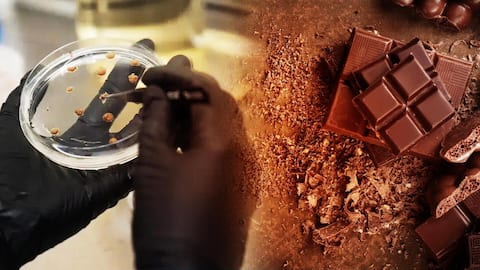Can lab-grown cocoa and fava beans redefine chocolate
What's the story
Planet A Foods, a German company, is revolutionizing the chocolate industry with its eco-friendly alternative, ChoViva. This innovative product is crafted from sunflower seeds, oats, shea butter, grape seeds, and sugar instead of traditional cocoa beans. The ingredients are locally sourced near the company's factory in Pilsen, Czech Republic, significantly reducing their carbon footprint compared to conventional chocolate production methods.
Cocoa concerns
The environmental impact of traditional cocoa production
Cocoa beans, the primary ingredient in traditional chocolate, are the fermented seeds of the cacao tree. However, only the seeds of this fruit are harvested, despite the tree's high water requirements. The majority of global cocoa production occurs in West Africa where prices have recently doubled due to droughts exacerbated by climate change. This environmental impact is leading companies like Planet A Foods to seek more sustainable alternatives for chocolate production.
Bean breakthroughs
Innovative alternatives to traditional chocolate production
UK-based company Nukoko is also exploring sustainable alternatives to cocoa beans, using fermented fava beans sourced from the UK and Europe for their chocolate products. Similarly, London-based Win-Win is creating dark chocolate using carob and barley. The company claims its production process uses 80% less water than conventional methods and emits 90% less carbon emissions, further highlighting the potential of these innovative approaches in reducing the environmental impact of chocolate production.
Cocoa crisis
The chocolate industry faces a meltdown
The chocolate industry is currently experiencing a crisis as cocoa prices have doubled since the beginning of the year. This price surge is due to droughts, worsened by climate change, affecting West Africa, which produces 80% of the world's cocoa. As a result, processing plants in countries such as Ghana and Ivory Coast have reduced or halted production. Major manufacturers are responding to this crisis by raising prices and cutting sales estimates, further exacerbating the industry's challenges.
Recipe refinement
The journey toward sustainable chocolate alternatives
Creating cocoa-free chocolate is a complex process that requires extensive research and experimentation. Max Marquart of Planet A Foods discussed the company's development of ChoViva, noting that they went through 500 iterations between the first prototype and the current formula, with none of the original elements making it into the final commercial product. This highlights the ongoing efforts to find sustainable and environmentally friendly alternatives to traditional chocolate production.
ChoViva's impact
Planet A Foods's sustainable chocolate alternative
Planet A Foods, which only supplies other manufacturers, has seen its ChoViva product used as an ingredient in over a dozen products sold in Germany. The company also produces cocoa butter and cocoa powder substitutes using sustainable processes. Marquart describes the manufacturing process as "short and sustainable," emphasizing that the ingredients are sourced close to their production facilities in the Czech Republic. Currently, ChoViva is primarily used in chocolate snacks and cereal rather than traditional chocolate bars.
Taste transition
The challenge of changing consumer behavior
Marquart acknowledges the challenge of changing consumer behavior toward cocoa-free chocolate. He believes that maintaining the same flavor and price as traditional chocolate, while offering increased sustainability, is key to encouraging consumers to switch. Marquart emphasized that attempting to change people's behaviors wouldn't be effective. Instead, he explained that the goal is to make it easy for consumers by ensuring no change in flavor or price, while simultaneously offering them greater sustainability at no additional cost.
